Credid-HRW
For Immediate Release
Burma: Japanese Leader’s Visit Should Highlight Rights
Development Aid, Investment Should Not Encourage Abuses
(Tokyo, May 24, 2013) – Japanese Prime Minister Shinzo Abe should make improving the human rights situation in Burma a top priority during his visit to the country this week, Human Rights Watch said today. Abe’s three-day visit, which begins May 24, 2013, will be the first by a Japanese leader to Burma in 36 years. Dozens of major Japanese corporations will accompany the prime minister.
Despite important changes in Burma, key human rights pledges by Burmese leaders remain unrealized, Human Rights Watch said. These include granting full humanitarian access to ethnic conflict areas, releasing all remaining political prisoners, amending abusive laws, and allowing the United Nations High Commissioner for Human Rights to establish offices in the country.
“As Burma’s biggest aid donor and a major investor, Japan can play a critical role by pressing harder for human rights reforms and protections,” said Brad Adams, Asia director at Human Rights Watch. “Aid and investment in Burma should not ignore needed reforms in the rule of law, transparency, and accountability.”
Japan is the largest aid donor to Burma, having extended US$500 million in the last year for concessional loans, and US$200 million in grant aid and technical assistance for agricultural development, health, and disaster preparedness. Abe is expected to announce a 50 percent increase in Overseas Development Assistance (ODA) during his visit, and a major program to revamp Burma’s postal system. Under the 1991 “Four Principles of ODA” and the ODA Charter of 1992, Japan has pledged to pay full attention to democracy, basic human rights, and freedoms in its aid decisions.
The Japanese government should ensure that investments and development projects do not contribute to land seizures and forced displacement throughout Burma, Human Rights Watch said. For instance, international telecommunications companies risk being linked to human rights abuses if they enter the Burmese market before adequate protections are in place. The Burmese government has not yet created a legal framework for the telecommunications sector that respects basic human rights, including the rights to freedom of expression and privacy. Two Japanese companies are participating in the tender process for two nationwide telecommunications licenses that Burma’s government will award in June.
“Japan has significant leverage to push the Burmese government in the right direction and pursue rights-respecting development that places public participation at its core,” Adams said. “Japan’s leaders should make sure that implementation of their aid projects match the rights rhetoric around them.”
Human Rights Watch called on Japan to ensure that its companies invest responsibly and transparently to avoid contributing to human rights abuses. Japanese companies should be required to respect human rights and take concrete steps – known as “human rights due diligence” – to prevent and address any rights abuses. The Japanese government should also mandate public reporting on investment in Burma, in line with United States requirements that were finalized on May 23.
“Japan should frontload human rights concerns during the political and economic transition in Burma,” Adams said. “Development projects in Burma have frequently been synonymous with abuses such as forced labor, land evictions, and denial of basic rights, and Japan should use its leverage to ensure these abuses end.”
To view the Human Rights Watch news release, “Letter to Prime Minister Noda” please visit: http://www.hrw.org/news/2012/
To read the Human Rights Watch report “‘The Government Could Have Stopped This’:Sectarian Violence and Ensuing Abuses in Burma’s Arakan State,” please visit:http://www.hrw.org/reports/
For more Human Rights Watch reporting on Burma, please visit:http://www.hrw.org/burma
For more information, please contact:In Tokyo, Riyo Yoshioka (English, Japanese): +81-80-3243-5079 (mobile); or yoshior@hrw.org
In Bangkok, Phil Robertson, (English, Thai): +66-85-060-8406 (mobile); or robertp@hrw.org. Follow on Twitter @Reaproy
In Washington DC, John Sifton (English): +1-917-838-9736 (mobile); or siftonj@hrw.org. Follow on Twitter @johnsifton
In San Francisco, Brad Adams (English): +1-510-926-8443 (mobile); or adamsb@hrw.org. Follow on Twitter @BradAdams
Burma: Japanese Leader’s Visit Should Highlight Rights
Development Aid, Investment Should Not Encourage Abuses
(Tokyo, May 24, 2013) – Japanese Prime Minister Shinzo Abe should make improving the human rights situation in Burma a top priority during his visit to the country this week, Human Rights Watch said today. Abe’s three-day visit, which begins May 24, 2013, will be the first by a Japanese leader to Burma in 36 years. Dozens of major Japanese corporations will accompany the prime minister.
Despite important changes in Burma, key human rights pledges by Burmese leaders remain unrealized, Human Rights Watch said. These include granting full humanitarian access to ethnic conflict areas, releasing all remaining political prisoners, amending abusive laws, and allowing the United Nations High Commissioner for Human Rights to establish offices in the country.
“As Burma’s biggest aid donor and a major investor, Japan can play a critical role by pressing harder for human rights reforms and protections,” said Brad Adams, Asia director at Human Rights Watch. “Aid and investment in Burma should not ignore needed reforms in the rule of law, transparency, and accountability.”
Japan is the largest aid donor to Burma, having extended US$500 million in the last year for concessional loans, and US$200 million in grant aid and technical assistance for agricultural development, health, and disaster preparedness. Abe is expected to announce a 50 percent increase in Overseas Development Assistance (ODA) during his visit, and a major program to revamp Burma’s postal system. Under the 1991 “Four Principles of ODA” and the ODA Charter of 1992, Japan has pledged to pay full attention to democracy, basic human rights, and freedoms in its aid decisions.
The Japanese government should ensure that investments and development projects do not contribute to land seizures and forced displacement throughout Burma, Human Rights Watch said. For instance, international telecommunications companies risk being linked to human rights abuses if they enter the Burmese market before adequate protections are in place. The Burmese government has not yet created a legal framework for the telecommunications sector that respects basic human rights, including the rights to freedom of expression and privacy. Two Japanese companies are participating in the tender process for two nationwide telecommunications licenses that Burma’s government will award in June.
“Japan has significant leverage to push the Burmese government in the right direction and pursue rights-respecting development that places public participation at its core,” Adams said. “Japan’s leaders should make sure that implementation of their aid projects match the rights rhetoric around them.”
Human Rights Watch called on Japan to ensure that its companies invest responsibly and transparently to avoid contributing to human rights abuses. Japanese companies should be required to respect human rights and take concrete steps – known as “human rights due diligence” – to prevent and address any rights abuses. The Japanese government should also mandate public reporting on investment in Burma, in line with United States requirements that were finalized on May 23.
“Japan should frontload human rights concerns during the political and economic transition in Burma,” Adams said. “Development projects in Burma have frequently been synonymous with abuses such as forced labor, land evictions, and denial of basic rights, and Japan should use its leverage to ensure these abuses end.”
To view the Human Rights Watch news release, “Letter to Prime Minister Noda” please visit: http://www.hrw.org/news/2012/
To read the Human Rights Watch report “‘The Government Could Have Stopped This’:Sectarian Violence and Ensuing Abuses in Burma’s Arakan State,” please visit:http://www.hrw.org/reports/
For more Human Rights Watch reporting on Burma, please visit:http://www.hrw.org/burma
For more information, please contact:In Tokyo, Riyo Yoshioka (English, Japanese): +81-80-3243-5079 (mobile); or yoshior@hrw.org
In Bangkok, Phil Robertson, (English, Thai): +66-85-060-8406 (mobile); or robertp@hrw.org. Follow on Twitter @Reaproy
In Washington DC, John Sifton (English): +1-917-838-9736 (mobile); or siftonj@hrw.org. Follow on Twitter @johnsifton
In San Francisco, Brad Adams (English): +1-510-926-8443 (mobile); or adamsb@hrw.org. Follow on Twitter @BradAdams








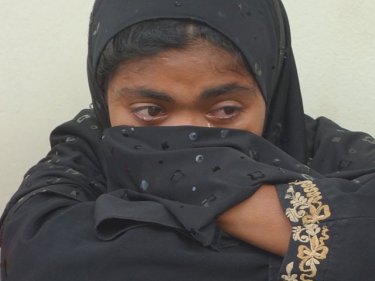




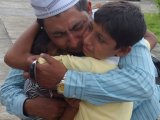

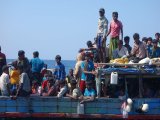
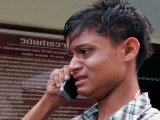

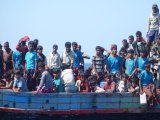

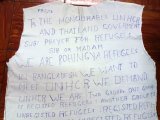
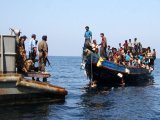

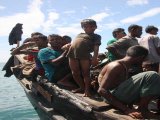
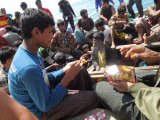
Why the government not allow full working authority to UNHCR to decide Refugee status of these war Refugees ?
Some NGOs and Human Rights workers may try to get release of these Rohingyas as per HELP ON POLICY.This so called HELP ON POLICY is nonsense but only helping Human trafficking. Human traffickers are waiting to get all these 2000 inmates through HELP ON POLICY. They should earn minimum 2000 USD per person x 2000= 4,000,000 (Four Millons USD).This trafficking business has been going since Rohingyas boat people started landing here.
Previously all detainees or Rohingyas reached in Thailand automatically fall at the hands of traffickers. Since end of January to now, unknown Rohingyas fell at the hands of traffickers .
Despite my calling in this regards for many months ,the boat people fate are still uncertain. The UNHCR publicly stated that Rohingyas boat people are not sent back to concentration camps of Burma. UNHCR is expecting Thai gov clear policy to get involve personal protection interview .
As a concerned party ,I will oppose so called HELP ON POLICY this time .
I am again calling to Honorable Prime Minister's good office to halt 'Help on' policy and allow UNHCR free access to determine Refugee status of this fleeing Roingyas from genocides.